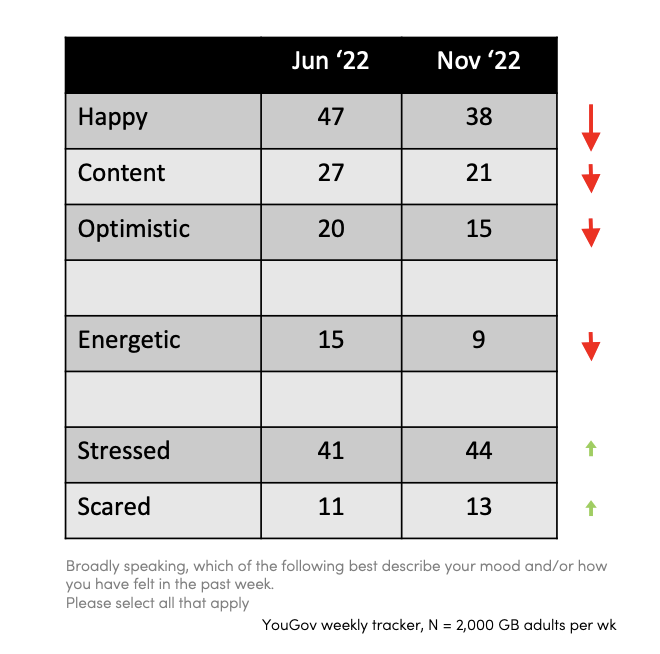Austerity in the UK officially happened between June 2010 and 2016. Over that period over 500 public service campaigns ran.
We looked at learnings from successful campaigns across that timeframe, including 12 documented in the IPA’s Effectiveness Databank, as well as from our own experience of running Public Sector communication.
From these, we have derived six principles that guide how to communicate successfully with a public who are experiencing increasing financial pressure and could be facing a reduction in public service provision.
They form six ‘watch words’. Note that we aren’t necessarily advocating the use of these words specifically, so much as the principles they represent.
But first, some context.
Mood of the moment

YouGov tracking clearly shows the public are not immune to the events happening around them and are affected generally and emotionally, not just specifically and rationally.
The shifts registered are more dramatic than at any time, bar the first lockdown.

Perhaps significantly, Londoners feel less affected, with the impacts greater the further from the Capital. (Source: YouGov tracking, N=2000 per wave).
The Learning in Six Watch Words
Keep
‘Loss aversion’ shows that people are more motivated to act to keep something they already have, rather than gain something new. In times of concern, deprivation and uncertainty the indications are they are even more likely to respond to ‘keep’ themed messaging.
Example: Keep Antibiotics Working
A campaign inviting people to ‘keep their retirement dreams alive’ is more likely to succeed than inviting them to open an ISA or other savings vehicle.
Us
Recently, the nation has experienced a revival in the power of collective comradeship. In personally difficult times, communications that share the burden and normalise the response tend to be better received than those directed ‘at’ people.
Example: It’s about us. Census 2021, Made in the UK Sold to the World
This collective comradeship will be even more important during a time of economic hardship. A campaign encouraging us all as a nation to be more energy smart would feel less inadvertently blaming and is more likely to be received and acted on.
Positive
Although many objectives are expressed in terms of people stopping, not doing, or cutting down on certain behaviours, the learning is that positive, benefit orientated approaches are more effective than threats, warnings, or negatively phrased instructions.
Example: Better Health, Get the Jump
Protect
The basic parental instinct to protect is more pertinent and more easily triggered in difficult times, when the sense of ‘threat’ is omnipresent.
Example: Protect our NHS
A campaign suggesting ways to ‘protect your lifestyle’ would be better received than one purely advocating making necessary cutbacks.
Doing
People naturally feel powerless in the face of external forces they can’t resist. When under financial pressure, consumers often appear more sensitised to other ‘threats’, often felt to be beyond their control, notably health & security.
In the face of these big forces, empowering them via specific things they can do (often small, but significant) is shown to be disproportionately effective, both in terms of the actions taken, but also in their broader attitudes towards the subject.
Examples here include: changing your password(s) to a strong one (= greater proactivity towards digital security), locking your car while going to pay for petrol (= being on the front foot against petty theft), keeping your mobile phone in your pocket as you emerge from stations (ditto), nominating a designated driver (responsible drinking), etc.
Now
Behavioural science suggests people discount the future as a motivation and favour the immediate. Indications are that this theme is exacerbated in difficult times, when the pain points feel more immediate and more pressing and many of the behaviours being advocated appear to offer largely long-term benefits.
The evidence shows that consumers are more likely to undertake activity that can be done immediately, easily, and completed within a short timeframe (if not now, then within days, rather than months or years). This is particularly important for initiatives that, by their very nature are long term, e.g. health, quitting smoking, saving, planning for the future.
Examples here include: Stoptober (quit for 28 days = more likely to say quit for good), checking your state pension age (trigger for longer retirement consideration), find out local service availability (e.g. in digital TV switchover this was the first step to becoming compliant).
Summary
Perhaps a step too far but in the spirit of ‘Every good boy deserves favours’, the six watch words form a convenient aide memoir for the times;
Keep us positive, protect doing now.



